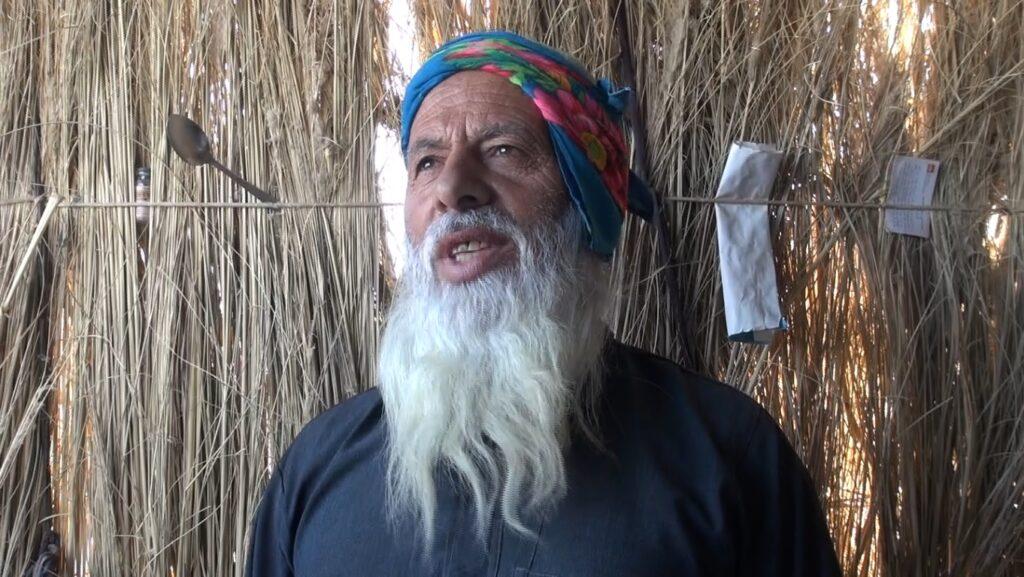MAZAR-I-SHARIF (Pajhwok): Displaced families in northern Balkh province are looking forward to peace to return to their areas and earn a living through farming.
Intensifying fighting in Afghanistan has forced many households to leave their areas, homes and properties and move to safer places.
Most of the displaced families are facing economic problems, living in tottering houses, under the open sky or in tents.
Syed Ghaibullah, member of a displaced family who left his home and property in the Sherin Tagab district of Faryab province about a your ago due to war, is currently .jpg) living in Mazar-i-Sharif.
living in Mazar-i-Sharif.
He told Pajhwok Afghan News he lived a happy and financially satisfactory life in his native area. But conflict had changed the course of his existence.
“Our district has a population of more than 200,000. Fighting has been ongoing there for years. In 2019, they came to know that the whole village had been captured by the Taliban.
“Clashes on a daily basis have become a routine affair, forcing residents to flee their homes,” Ghaibullah explained.
According to him, Sherin Tagab has 134 villages, which are currently under Taliban control. The government’s writ was limited to the district building, he remarked.
Ghaibullah said his and other families had survived conflict, leaving everything behind. “We only had time to flee our house.
“We had to leave behind our orchards and other valuables. It’s been a year that we have no idea about our property and other items,” the man said.
Firefights between the Taliban and government forces happened on a daily basis, with blind rockets fired by both sides into civilian homes, he alleged.
The war-affected man said about 185 families had migrated to Mazar-i-Sharif and were currently living in an old camp southeast of the provincial capital.
Ghaibullah, living in an old rented house, found it hard meeting his family’s economic needs. Being through daily wager, life has become too heavy a burden for him to carry.
He did not expect much assistance from the government either, saying the authorities were unable to help all internally-displaced people.
“If there was no war in the country and if we were living in peace, our lives would not have been so miserable,” the man commented.
Syed Ghaibullah, 40, is awaiting the outcome of peace talks between the government and the Taliban in Doha. He hoped the negotiations would yield a positive outcome and they would return home.
“Both the security forces and the Taliban are sons of the soil. Now that they started talks, we urge them to agree on ending the war as soon as possible.”
The displaced individual said if conflict came to an end today, he would return along with his family to their native town tomorrow.
It is not only Ghaibullah who has fled his home and sought refuge in another province. Thousands of other families are also living as refugees in Balkh.
Mohammad Issa, a resident of the Zarah district of Balkh, fled his area six months ago due to fighting. The 65 years old is currently living in Dehdadi district.
He told Pajhwok he had endured fighting for some time between pro-government forces and the Taliban. But at last, he had to flee as life became harder.
Living in a tent in a dessert along with some other villagers, he said they lived a satisfactory life and owned farmlands in his native district.
But after they were forced from the area, their lands were usurped by powerful individuals.
“I don’t think we I return to my village until the war ends and peace returns. In the present situation, living there is impossible.
“Yes, if there is peace, then we are more likely to go back to our native area,” he continued.
He had no optimism that the ongoing talk between the government and the Taliban would yield any immediate outcome. But he hoped to find a way to end the conflict.
Manezha, hailing from Jawzjan province, has migrated to Mazar-i-Sharif. She also fled due to fighting and came to this city along with her family..jpg)
Manezha, trying to resolve the problems of displaced families, told Pajhwok the displaced people faced discriminatory treatment besides other problems.
“The problem is not only that the IDPs are facing a shortage of food, clothing and shelter, but they are also not being treated as residents by the authorities,” she grumbled.
She said many displaced families did not have access to education services and local officials were did care.
A disaster would happen if the ongoing war was not ended and looking at the situation of displaced families, he added.
At the same time, a number of foundations working to include the demands of fighting-affected families in the onging peace talks, saying the warring parties should not waste more time.
Zahra Hussaini, an official of the Afghanistan Institute for Democracy and Human Rights, said the views and demands of displaced families should be included in peace negotiations.
She told Pajhwok that durable peace could only come if views and demands of people from all walks of life were respected.
“We are in touch with many displaced families, all of whom have one demand -- an end to war and consideration of their views during negotiations,” he said.
She claimed the number of IDPs was increasing with each passing day, a major problem in itself.
She also suggested the peace talks should be accelerated and that the parties involved should not waste time.
The Department of Refugees and Repatriation said there were around 22,000 displaced families in Balkh.
A vast majority of IDPs in Balkh have been displaced from neighbouring provinces due to conflict and insecurity.
Official of the department admitted they were unable to help all needy families. They provide aid to only those who are in a state of emergency.
This report has been produced by Pajhwok and financially supported by UNDP and Denmark.
Sa/mud








GET IN TOUCH
NEWSLETTER
SUGGEST A STORY
PAJHWOK MOBILE APP